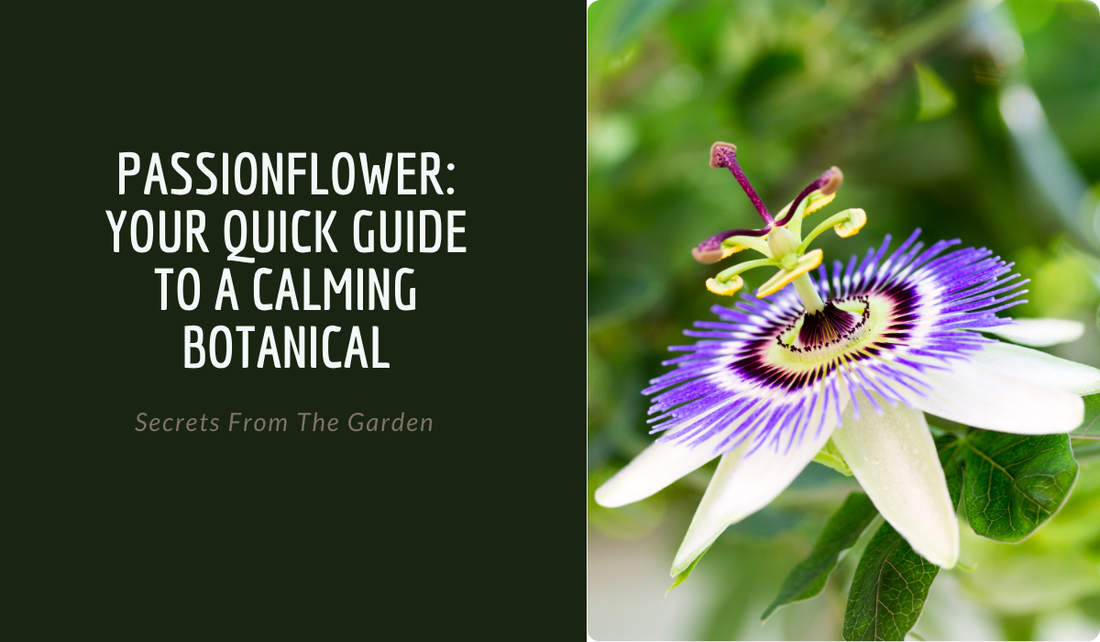
Passionflower: Your Quick Guide to a Calming Botanical

Passionflower: Your Guide to a Calming Botanical
In the world of natural remedies, few plants possess a beauty as striking as passionflower. With its intricate, otherworldly blossoms, it's a sight to behold. But beyond its visual appeal and cultural significance, Passiflora incarnata has a long history of use in traditional medicine and has been cherished for thousands of years for its calming and soothing properties. Today, we are lucky to be given the "proof" from the technological advancements of our time.
Passiflora incarnata: a must have natural ally for stress and anxiety.
One of the most well-documented uses of passionflower is its ability to help manage anxiety. Herbalists have long considered it a "nervine," an herb that soothes and calms the nervous system. The secret to its anti-anxiety effects is thought to lie in its influence on a key neurotransmitter in the brain: gamma-aminobutyric acid, or GABA. Passionflower has been shown in research to interact with GABA, thus passionflower may produce a similar like effect as the pharmaceuticals that interact with GABA, but without the side effects.
GABA is an inhibitory neurotransmitter, meaning it helps to quiet down overactive brain signals. By increasing the levels and activity of GABA, passionflower can promote relaxation through the mind and body. Studies have even suggested that passionflower extract can be as effective as some prescription medications for anxiety symptoms, and with fewer side effects like drowsiness or impaired performance.
This makes passionflower a popular choice for those looking for a gentle, natural way to cope with everyday stress or pre-operative jitters.

Promoting Restful Sleep
If you've ever struggled with a racing mind at bedtime, you know how frustrating it can be to try and fall asleep. Passionflower's calming effects extend to the realm of sleep, making it a traditional, yet valuable remedy for insomnia and sleep disorders. By quieting the nervous system, it can help you transition more easily into a peaceful state, allowing for a more restful night's sleep.
Some research has shown that drinking passionflower tea can improve overall sleep quality, though more studies are needed to fully understand its effects on the time it takes to fall asleep or stay asleep. It's often combined with other calming herbs like chamomile, valerian root, and lemon balm for a powerful bedtime blend.

Other Potential Benefits
While anxiety and sleep are the primary areas of focus, passionflower is also being investigated for a range of other potential health benefits. Traditional uses and preliminary research suggest it may be helpful for:
-
Pain: Its affinity or direct action on the central nervous system, have led to its use in traditional medicine for headaches, menstrual cramps, and other pain-related conditions.
-
Menopausal symptoms: The herb may help alleviate mood-related symptoms of menopause, such as anxiety and emotional swings. When paired with valerian, it is great for easing menstrual discomfort.
- ADHD symptoms: Some early studies suggest passionflower may help manage easing symptoms of attention-deficit/hyperactivity disorder. Symptoms passionflower has been shown to help with is sleep and anxiety. Read more about that here.

Key takeaways and safety!
Passionflower is available in a variety of forms including teas, tinctures, capsules, and extracts. The proper dosage can vary depending on the form and the individual, so it's always best to work with an herbalist on dosage. If an herbal remedy didn't work for you I'd say the extract wasn't pure, or the dosage wasn't correct.
It's important to remember that while passionflower is generally considered safe for most people, it's not without its precautions. Possible side effects can include dizziness, drowsiness, and confusion. It should be avoided during pregnancy as it may cause uterine contractions. Additionally, passionflower can interact with certain medications, particularly sedatives and blood thinners. Always speak with your doctor before starting any new herbal supplement, especially if you are taking other medications or have an existing health condition.
Disclaimer: Lauren is not a doctor, and this blog post is for informational purposes only and does not constitute medical advice. Always consult with a qualified healthcare professional before using passionflower or any other herbal supplement.
References
Passionflower: Usefulness and Safety | NCCIH

